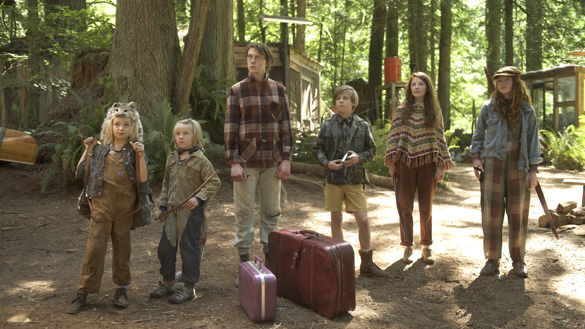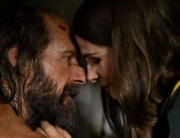
Left to right, Shree Crooks , Charlie Shotwell, George MacKay, Nicholas Hamilton , Samantha Isler, and Annalise Basso in Captain Fantastic (Wilson Webb/Bleecker Street)
The Un Certain Regard section at Cannes has traditionally showcased the work of directors toward the beginning of their careers (though not always), as a sort of counterpart to the big names competing for the Palme d’Or. Some of the better-known filmmakers this year included Hirokazu Kore-eda (for the drawn-out family drama After the Storm) and David Mackenzie (Hell or High Water, a noir set under the Texas sun). But there was a palpable anticipation, at least among the North American press and especially for those under 30, for the second film written and directed by actor Matt Ross, Silicon Valley’s irascible and capitalistic king, Gavin Belson.
The selection of Ross’s Captain Fantastic, which was earlier set loose at the Sundance Film Festival, served as an antidote to many of the oh-so-serious films in this section. It’s an all-round crowd-pleaser. In its tone, it deliberately sets off in many directions over its two hours. It’s also one movie divided into three, with only its last third coming close to the conventional and succumbing to the sentimental. (Hey, two out of the three ain’t bad.)
The arresting first act plunges Into the Wild by way of a Swiss Family Robinson that has gone back to nature with a vengeance. It begins with a hunt as a teen, smeared in mud, stalks a deer. (In what has become a ubiquitous art-house trope, at least one more dismembered animal carcass was featured at this year’s festival.) The hunter is part of a blond and red-headed horde of six kids, ranging from ages seven to 18, living within a kerosene-lit cabin and tepee overseen by Ben Cash (fit-as-a-fiddle Viggo Mortensen), their father.
The compound is also a makeshift liberal arts college, where instead of TV or mobile devices, there’s political theory for entertainment—one tyke announces he has now become a Maoist. The kids’ exalted reading list includes Middlemarch (good luck) and The Joy of Sex. But the classic texts and strenuous physical training have only prepared them for life within their isolated idyll in the Pacific Northwest, not for what’s outside of the coop (or, in this case, co-op).
The kids have an insatiable curiosity, though not necessarily of the outside world. One exception is the oldest, the hunter seen in the opening, Bo, played by the rising actor George MacKay (Pride). Bach-loving Bo has secretly applied to university and has been accepted to every Ivy League school and then some. Bo’s accomplishment may seem like an exaggeration, but as a storyteller, Ross takes few half-measures when it comes to his characters’ actions; it’s all or nothing, in simpatico with Ben.
Hence, the back-to-the-woods vibe is not all loosey-goosey. Ben runs the camp with a gentle but rigid hand and an army-like precision. The kids’ routine, including their free time, is regimented, and they all fall in lockstep. (In a different environment, these good-looking, clean-cut kids could be part of Up with People or a 1990s ABC Friday night sitcom). They all seem too good to be true, and the script tacitly acknowledges this by putting the entire family to the test, taking them on the road to New Mexico, where they will butt heads with Middle America. Once they hit the highway in the family bus, the pace quickens and so does the anticipation of how these fish will respond outside of water. Ross keeps the mood buoyant, considering the reason for the family’s journey is the funeral of the kids’ mother, who has just died of a long illness.
In the movie’s midsection, family friction plus quirky culture clashes plus road trip nearly equals Little Miss Sunshine, but without the dysfunction or black humor. The comedy derives from the family’s single-minded righteousness when challenged—the eldest daughter takes pride in not making fun of people, “except Christians”—and how for all the life skills Ben has taught his brood, humility and tolerance are not particularly high on the list. The kids are smarter than their contemporaries and most adults, and they know it.
Ben doesn’t play nice by anyone’s rules, even when he and the kids are the guests at the cookie-cutter suburban home of his brother-in-law (Steve Zahn). Here, the film pokes and prods at Ben’s privileged, white liberalism: In addition to the family taking time out of their trip to celebrate Noam Chomsky’s birthday, it’s never clear how Ben could afford the land he’s been living on or any of the day-to-day expenses.
However, in the third act, the satiric slant widens its view, taking in the country club, Fox News- and gun-toting-set when Ben interrupts and abruptly presides over the funeral mass. It’s also the first time the kids, dressed up liked space-age flower children, meet their grandparents. It’s roughly here where the conventions of drama take over, with a father-and-son confrontation that has been building up and Ben’s banishment from the McMansion of his father-in-law (Frank Langella), who is also formidably firm in his convictions.
Not entirely credible, the main storyline turns into a caper. Bizarrely, Ben and the Cash clan break at least two laws yet face no consequences; it really is like they are living in their own world of rules and behavior. Toward home stretch, the movie begins to share a commonality with one of Mortensen’s most popular past endeavors, The Lord of the Rings: The Return of the King: multiple endings.
The film’s biggest strength lies in Ross’s direction of the actors, who are convincing even when the circumstances are not. His entire ensemble is impeccably cast, and never before has Mortensen been freer. It’s quite a departure from his contained performances in recent art-hour fare Jauja and Far From Men. He’s willing to risk acting foolish without winking to the camera, going full-on gonzo and full-on frontal.
Ross was a fitting choice for Un Certain Regard’s Best Director award. For all of the film’s twists and turns (Wait, what kind of movie is this again?), the comedy is often exuberant and the family dynamic nevertheless convincing. It doesn’t hurt that the main cast looks like they share the same gene pool. Just as importantly, they behave as though they have been living under the same roof. One could patly sum up the film in a one-word verdict: interesting. However, that would shortchange the accomplishments of Captain Fantastic, while proving Ben, ever the grammarian, correct: It’s a description that doesn’t mean anything.






Leave A Comment